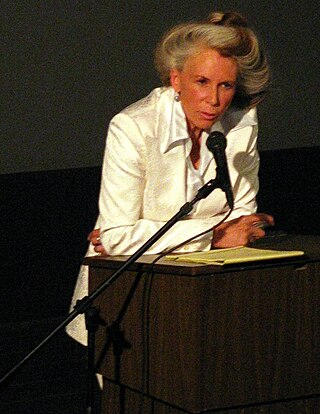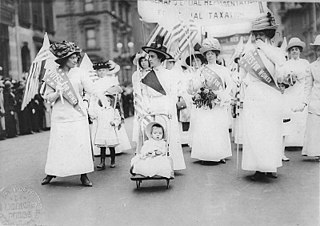Feminism is a range of socio-political movements and ideologies that aim to define and establish the political, economic, personal, and social equality of the sexes. Feminism holds the position that societies prioritize the male point of view and that women are treated unjustly in these societies. Efforts to change this include fighting against gender stereotypes and improving educational, professional, and interpersonal opportunities and outcomes for women.
Misandry is the hatred of, contempt for, or prejudice against men or boys.
Gender studies is an interdisciplinary academic field devoted to analysing gender identity and gendered representation. Gender studies originated in the field of women's studies, concerning women, feminism, gender, and politics. The field now overlaps with queer studies and men's studies. Its rise to prominence, especially in Western universities after 1990, coincided with the rise of deconstruction.
Women's studies is an academic field that draws on feminist and interdisciplinary methods to place women's lives and experiences at the center of study, while examining social and cultural constructs of gender; systems of privilege and oppression; and the relationships between power and gender as they intersect with other identities and social locations such as race, sexual orientation, socio-economic class, and disability.

Catharine Alice MacKinnon is an American feminist legal scholar, activist, and author. She is the Elizabeth A. Long Professor of Law at the University of Michigan Law School, where she has been tenured since 1990, and the James Barr Ames Visiting Professor of Law at Harvard Law School. From 2008 to 2012, she was the special gender adviser to the Prosecutor of the International Criminal Court.
Feminist theory is the extension of feminism into theoretical, fictional, or philosophical discourse. It aims to understand the nature of gender inequality. It examines women's and men's social roles, experiences, interests, chores, and feminist politics in a variety of fields, such as anthropology and sociology, communication, media studies, psychoanalysis, political theory, home economics, literature, education, and philosophy.
Feminist legal theory, also known as feminist jurisprudence, is based on the belief that the law has been fundamental in women's historical subordination. Feminist jurisprudence the philosophy of law is based on the political, economic, and social inequality of the sexes and feminist legal theory is the encompassment of law and theory connected.The project of feminist legal theory is twofold. First, feminist jurisprudence seeks to explain ways in which the law played a role in women's former subordinate status. Feminist legal theory was directly created to recognize and combat the legal system built primarily by the and for male intentions, often forgetting important components and experiences women and marginalized communities face. The law perpetuates a male valued system at the expense of female values. Through making sure all people have access to participate in legal systems as professionals to combating cases in constitutional and discriminatory law, feminist legal theory is utilized for it all.

Intersectionality is a sociological analytical framework for understanding how groups' and individuals' social and political identities result in unique combinations of discrimination and privilege. Examples of these factors include gender, caste, sex, race, ethnicity, class, sexuality, religion, disability, height, age, weight and physical appearance. These intersecting and overlapping social identities may be both empowering and oppressing. However, little good-quality quantitative research has been done to support or undermine the practical uses of intersectionality.

Patricia Hill Collins is an American academic specializing in race, class, and gender. She is a distinguished university professor of sociology emerita at the University of Maryland, College Park. She is also the former head of the Department of African-American Studies at the University of Cincinnati. Collins was elected president of the American Sociological Association (ASA), and served in 2009 as the 100th president of the association – the first African-American woman to hold this position.
Susan Moller Okin was a liberal feminist political philosopher and author.

Michael Scott Kimmel is an American retired sociologist specializing in gender studies. He was Distinguished Professor of Sociology at Stony Brook University in New York and is the founder and editor of the academic journal Men and Masculinities. Kimmel is a spokesman of the National Organization for Men Against Sexism (NOMAS) and a longtime feminist. In 2013, he founded the Center for the Study of Men and Masculinities at Stony Brook University, where he is Executive Director. In 2018 he was publicly accused of sexual harassment. He filed for retirement while Title IX charges were pending; no charges were subsequently filed.

Sociology of gender is a prominent subfield of sociology. Social interaction directly correlated with sociology regarding social structure. One of the most important social structures is status. This is determined based on position that an individual possesses which effects how they will be treated by society. One of the most important statuses an individual claims is gender. Public discourse and the academic literature generally use the term gender for the perceived or projected (self-identified) masculinity or femininity of a person.
The men's movement is a social movement that emerged in the 1960s and 1970s, primarily in Western countries, which consists of groups and organizations of men and their allies who focus on gender issues and whose activities range from self-help and support to lobbying and activism.

The feminist school of criminology is a school of criminology developed in the late 1960s and into the 1970s as a reaction to the general disregard and discrimination of women in the traditional study of crime. It is the view of the feminist school of criminology that a majority of criminological theories were developed through studies on male subjects and focused on male criminality, and that criminologists often would "add women and stir" rather than develop separate theories on female criminality.
Feminist anthropology is a four-field approach to anthropology that seeks to transform research findings, anthropological hiring practices, and the scholarly production of knowledge, using insights from feminist theory. Simultaneously, feminist anthropology challenges essentialist feminist theories developed in Europe and America. While feminists practiced cultural anthropology since its inception, it was not until the 1970s that feminist anthropology was formally recognized as a subdiscipline of anthropology. Since then, it has developed its own subsection of the American Anthropological Association – the Association for Feminist Anthropology – and its own publication, Feminist Anthropology. Their former journal Voices is now defunct.

Feminism is aimed at defining, establishing, and defending a state of equal political, economic, cultural, and social rights for women. It has had a massive influence on American politics. Feminism in the United States is often divided chronologically into first-wave, second-wave, third-wave, and fourth-wave feminism.
Patriarchy is a social system in which positions of dominance and privilege are held by men. The term patriarchy is used both in anthropology to describe a family or clan controlled by the father or eldest male or group of males, and in feminist theory to describe a broader social structure in which men as a group dominate women and children.
Feminist metaphysics aims to question how inquiries and answers in the field of metaphysics have supported sexism. Feminist metaphysics overlaps with fields such as the philosophy of mind and philosophy of self. Feminist metaphysicians such as Sally Haslanger, Ásta, and Judith Butler have sought to explain the nature of gender in the interest of advancing feminist goals.
Multiracial feminist theory is promoted by women of color (WOC), including Black, Latina, Asian, Native American, and anti-racist white women. In 1996, Maxine Baca Zinn and Bonnie Thornton Dill wrote “Theorizing Difference from Multiracial Feminism," a piece emphasizing intersectionality and the application of intersectional analysis within feminist discourse.

All the Women Are White, All the Blacks Are Men, But Some of Us Are Brave (1982) is a landmark feminist anthology in Black Women's Studies printed in numerous editions, co-edited by Akasha Gloria Hull, Patricia Bell-Scott, and Barbara Smith.










